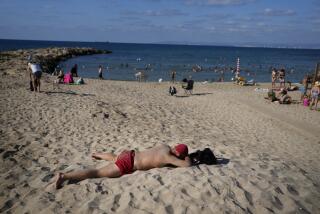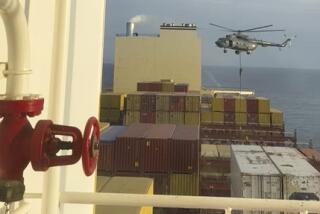Outward Calm Masks the Emirates’ Jitters
- Share via
MANAMA, Bahrain — The idea had been to sound the civil defense sirens to demonstrate that this tiny Persian Gulf emirate was at least prepared for the possibility of a gas attack by Iraq. But at the appointed hour, there was nothing but silence.
Fire Chief John Clitherow admitted later that there had been some “technical difficulties” but promised to keep up the testing in the next two days “to improve the coverage.”
With the nearing of the U.N. deadline for Iraq’s withdrawal from Kuwait, the sheikdoms that dot the gulf are trying to maintain an outward calm despite increasing jitters about what the outcome will be.
For example, in Dubai, one of the United Arab Emirates, an American resident said that U.S. companies began shipping home workers and their families only after major airlines started announcing that they would stop flying to the area. The Dutch airline KLM and Hong Kong-based Cathay Pacific were just two of the carriers to halt their flights on Friday after war-risk insurance rates were vastly increased.
In contrast, Air India announced that it was increasing its flights and the size of its aircraft to the gulf to accommodate an exodus by the 400,000-strong Indian community. “Under the present situation, there is a guaranteed loss on each flight even at full load,” said Air India’s regional director, Michael Mascarenhas. “But we will maintain our normal operations unless airspace is closed.”
Bahrain, the island emirate just off the Saudi Arabian port of Dhahran, is fairly close to possible combat between Iraq and U.S.-led forces, and many air carriers have halted their flights to the island.
British Airways laid on an extra Boeing 747 flight Sunday night but cancelled its regularly scheduled Tuesday night flight to London. Gulf Air, an airline owned jointly by Bahrain, Qatar and the United Arab Emirates, has been overbooked on every flight out of the country leading up to the U.N. deadline, which falls at 8 a.m. Wednesday in the Persian Gulf region.
“I think with the expatriates leaving, it reduces the element of panic,” said Tarik Moyyad, Bahrain’s minister of information. “The people of Bahrain can’t go away forever, and 90% of Bahrainis have stayed. Confidence is very high.”
Moyyad said the country had begun round-the-clock radio broadcasting three weeks ago to keep citizens informed and was increasing the number of news shows and programs about civil defense.
“The majority of the people know that the elements of danger are not great,” he said.
A Bahraini Education Ministry official announced, however, that schools will be closed from Wednesday until Feb. 9.
There was no panic buying of food or gasoline. With a huge American and British military presence in Bahrain, Qatar and Dubai, people appeared to be taking solace from the huge defensive umbrella offered by the presence of warplanes and navy ships.
An informal survey of shopkeepers and taxi drivers suggested that most Bahrainis still don’t believe that war will take place. “Saddam Hussein is no fool,” said one taxi driver. “He knows you cannot beat the Americans. He will not fight.”
Bahrain’s hotels are jammed with American military personnel dressed in civvies. Dubai’s hotels are suffering the loss of a tourism season, but a last-minute wave of arrivals by journalists who couldn’t get into Saudi Arabia was beginning to fill rooms there as well.
Bahraini officials were said to be peeved at British government officials who started handing out gas masks to the British expatriate community on the island, which had the effect of making Bahrainis wonder why they were not getting them too.
While the Saudi government has been making gas masks available in its Eastern province to calm fears among the local population, none of the gulf emirates have been handing out chemical warfare protection gear. In Bahrain, gas masks have been sold sporadically in the open market, but a complete rubber suit can cost upwards of $600.
“People are nervous, not just Bahrainis and Qataris but expatriates as well because they don’t know what will happen,” said one Western European envoy. “If nothing else, this talk of gas warfare has been a psychological victory for Iraq.”
About half of the estimated 1,500-strong American expatriate community has already left Bahrain, according to embassy estimates.
The United Arab Emirates appeared to be far enough away from the possible gulf battle zone to eliminate fears about gas. But a bemused British resident of Dubai said he had received an official letter from the British Consulate warning him to watch periodically for falling birds--a warning sign of a gas attack.
The letter advised British residents that, if they see birds suddenly dropping to earth, to climb into their bathtubs and put wet towels over their faces.
“The letter was straight out of Monty Python,” said the expatriate, referring to the British comedy troupe.
More to Read
Sign up for Essential California
The most important California stories and recommendations in your inbox every morning.
You may occasionally receive promotional content from the Los Angeles Times.













